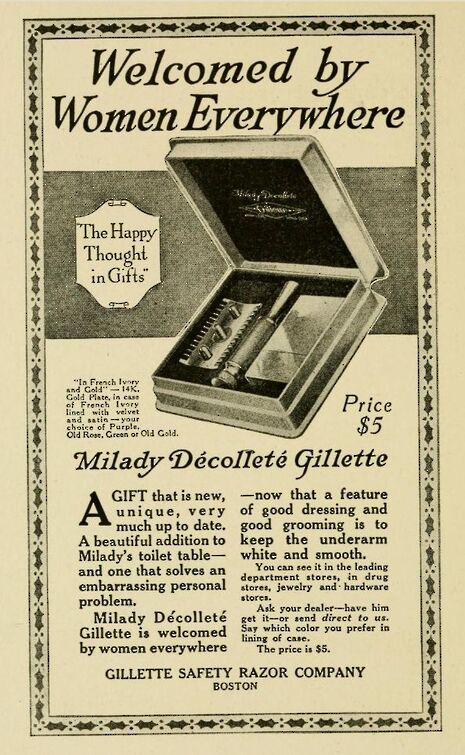Summer, shaving, and a feminist lesson in history
Alex Ridley explains why the history of female shaving in the Western world makes the modern practice problematic

Summer approaches, and with it comes the promise of summer dresses and bikinis, shorts and sunbathing. This season, for the first time, my legs will not only be covered in the factor 50 sunscreen my paleness demands, but also a smattering of ginger hairs. They are natural, they do not decrease my femininity, and I will never spend £40 on razors in Boots again.
The beginning of female shaving in the Western world can be attributed to many factors: the rise of the middle class, the shortage of stockings in the World Wars, and the shortening of hemlines and changing fashions . But really, the beginning of shaving was in women being told that it was something they should do, by razor companies driven by profits and run by men. Gillette introduced the first female razor in a 1915 advertisement. It called underarm hair “an embarrassing personal problem” that needed solving.
Funnily enough, no male razor adverts at the time suggested that underarm hair was at all embarrassing or needed removal. Instead, male razor ads focused on the feeling of shaving and the quality of the razor.
For women, it was very much about appearances . The ads were seasonal, appearing in time for a summer of swimming and short sleeves, and disappearing as women started to cover up again when the cold weather returned. A 1930s ad even featured a drawing of a woman sitting alone in a restaurant with “Unloved!” boldly plastered above her head. “Why doesn’t she shave?” the ad asks. In 1941, the beauty editor of Harper’s Bazaar wrote: “if we were dean of women, we’d levy a demerit on every hairy leg on campus”.
In a society where being on trend was of paramount importance, and no woman wanted to stand out for the wrong reasons, these ads fed on women’s fears of being mocked, lonely and unfeminine – by creating a problem they hadn’t realised they had. It seems society hasn’t changed much since then. In fact, I would argue it’s getting worse.
While adverts now are perhaps not as directly instructional or targeting, the pressure has become more subtle. Hair below the eyebrows on women is something we wouldn’t realise existed if we didn’t have to deal with the ‘embarrassment’ of it ourselves. We don’t see it on models or celebrities – or even on the actors in hair removal ads. We pretend it doesn’t exist, and removal has become the accepted default. When I Googled what to expect from my first gynecologist appointment I was instructed to “groom your area appropriately”. Before dropping me off at university my mother set loose on my face with a newly-bought set of tweezers, informing me that I wouldn’t make friends if I had “a beard”.
Shaving has become yet another ritual which women must add to their daily toilette in order to appear feminine, but there is also an expectation that hairlessness must be effortless. We do not acknowledge or even think about the natural state of the female body. “Nature has many surfaces that are smooth and soft. Just like a woman” read an advertisement for a shaver in Marie Claire. “Larger-than-life actress Mo’Nique famously surprised Golden Globe guests on the red carpet with her hairy legs last year” reads a 2011 Daily Mail article - apparently a woman having hairy legs is news. Daily Mail readers will be pleased to know that she has since “upped her grooming regime”.
Shaving is a given, so embedded in our expectations of women’s appearance that we forget about it. This is nicely illustrated by a conversation that I have had more than once with multiple male friends. It usually goes something like this: they make a remark on the pain of having to shave regularly – “Oh, I know!” I emphasise, and then watch their face morph into confusion for a few seconds before eventually understanding.
Feminist scholar Wendy Chapkis wrote that ‘‘there can be no truly empowering conclusions until our beauty secrets are shared.’’ This thinking is why, despite enjoying the feeling of freshly-shaved legs as much as any other woman, I feel I cannot justifiably call myself a feminist and continue to shave my legs. Knowing now how the practice was introduced in the Western culture in which I live, my shaved legs would simply not sit with my ideas of female beauty and independence. This summer I will be sexy, attractive and confident – razor not in tow.
 Comment / Anti-trans societies won’t make women safer14 November 2025
Comment / Anti-trans societies won’t make women safer14 November 2025 Fashion / You smell really boring 13 November 2025
Fashion / You smell really boring 13 November 2025 News / Controversial women’s society receives over £13,000 in donations14 November 2025
News / Controversial women’s society receives over £13,000 in donations14 November 2025 Features / Beyond the Pitt Club: The Cambridge secret societies you have never heard of16 November 2025
Features / Beyond the Pitt Club: The Cambridge secret societies you have never heard of16 November 2025 News / A matter of loaf and death17 November 2025
News / A matter of loaf and death17 November 2025








